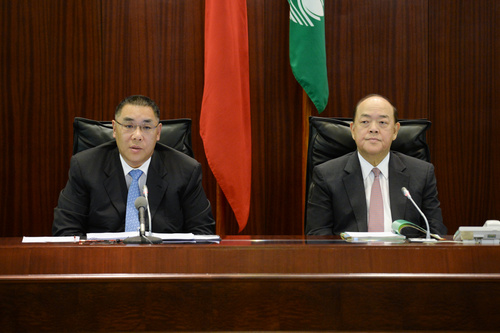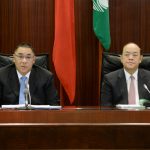 The Chief Executive, Mr Chui Sai On (left), takes legislators’ questions on Government policy and social issues during a plenary session of the Legislative Assembly.
The Chief Executive, Mr Chui Sai On (left), takes legislators’ questions on Government policy and social issues during a plenary session of the Legislative Assembly.
The Chief Executive, Mr Chui Sai On, today said the Government expected the city’s economy to register expansion in the year 2017. Macao had a sound economic outlook, considering the latest data showed the year-on-year contraction in the city’s gross domestic product was on course to narrow to between 7.2 percent and 9 percent in 2016, compared to last year’s 20.3 percent contraction. The city’s fiscal revenue totalled 16.36 billion patacas in the first five months of the year, in line with the Government’s expectation, said Mr Chui, in response to a legislator’s question during today’s plenary meeting of the Legislative Assembly. Mr Chui said he noted the ongoing adjustment period of the city’s gaming industry might affect Macao’s economy. The Government had been closely monitoring its budgets and expenditures, but spending on welfare and on supporting the well-being of the public had not been – and would not be – affected by the streamlining of public spending. Regarding policies relating to employment, the Chief Executive said the Government would review the ratio of non-resident workers to local workers, upon completion of the currently under-construction large-scale projects. To ensure further that local residents were given priority for employment, the Government would implement a scheme to reduce the number of non-resident workers; and implement stricter policies when evaluating new applications for non-resident workers or renewal of existing non-resident work visas. He said the Government’s principles were: not to approve any applications for non-resident workers in cases where Macao residents were willing and qualified to do that work; not to approve renewal applications for non-resident workers in large-scale enterprises; and not to approve any new or renewed applications for those workers – in particular, people working in senior management – in casinos companies and in large retail shops. Up to the end of May, local residents accounted for 84 percent out of some 29,000 senior management staff working for the six gaming concessionaires. This was a significant increase compared to the previous figures; and followed the offer by the Government of in-job training and other employment services, said Mr Chui. In relation to support for local business, Mr Chui said the Government would launch – via Macao’s first Five-Year Development Plan – more favourable policies to support development of local small- and medium-sized enterprises (SMEs); and, if needed, update the legal framework in order to enhance Macao’s business environment. Currently, the Government has several measures to facilitate development of local SMEs, such as tax waivers, simplified administrative procedures, and financial subsidies. The Government was considering a greater role for local SMEs in advancing Macao’s bridging role between China and the Portuguese-speaking countries. During the Legislative Assembly’s afternoon session, Mr Chui answered a total of 29 questions from Legislative Assembly members. The inquiries covered subjects such as: entrepreneurship among young people; management of Macao’s waters; the optimisation of administrative procedures; land concessions granted but not developed; the city’s gaming industry; diversification of Macao’s economy; welfare for civil servants; regulations for security forces; policy support for sport involving people with physical or mental challenges; sports facilities; cultivation of local talent; the Land Law; the healthcare system; and development of the city’s tourism industry.


